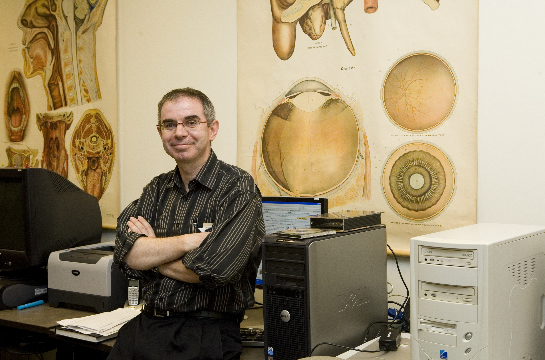Partnerships That Make a Difference
 Speech-Language Pathology and Parkinson’s disease. Pascal van Lieshout is uncovering the effects of Parkinson’s disease on speech and swallowing skills. He aims to develop a better understanding of this disorder to improve assessment and treatment. With collaborators, he is creating innovative tools to improve assessment of voice problems and remediate limitations in facial expression in individuals with Parkinson’s disease.
Speech-Language Pathology and Parkinson’s disease. Pascal van Lieshout is uncovering the effects of Parkinson’s disease on speech and swallowing skills. He aims to develop a better understanding of this disorder to improve assessment and treatment. With collaborators, he is creating innovative tools to improve assessment of voice problems and remediate limitations in facial expression in individuals with Parkinson’s disease.
Dr. Pascal van Lieshout holds a Canada Research Chair in the area of oral motor control across the lifespan. He has a broad range of interests, working with colleagues and students from a variety of disciplines, including psychology, engineering, linguistics and rehab sciences. One of his main interests relates to improving our ability to access oral motor function in patients with speech disorders, such as found in patients with Parkinson’s disease. The current standard of relying on perceptual indices has serious drawbacks when it comes to detecting and understanding the underlying mechanisms and sources of oromotor problems. In collaboration with Dr. Anthony Lang, Senior Scientist at the Patient Based Clinical Research Toronto Western Research Institute (TWRI) and Jack Clarke Chair at the University of Toronto Centre for Research in neurodegenerative Disease, Dr. Willy Wong (Dept. of Electrical & Computer Engineering and Institute of Biomaterials and Biomedical Engineering) and Dr. Catriona Steele (Senior Scientist at the Toronto Rehabilitation Institute), he has conducted several studies on motor control issues in patients with PD during speech, swallowing and voicing using sophisticated state-of-the-art technologies to detect sub-perceptual but important limitations in tongue control and voice stability. Such discoveries may lead to advancements in diagnostic procedures using objective measures that can reliably and consistently identify changes in oromotor parameters at early and more advanced stages of the disease. One applied aspect of this research focuses on developing a prototype of a facial motion feedback tool, which may help patients with PD in the future to mitigate their well-known limitations to use facial expression in speech. Although the design is still in its early stages, early tests on some of the basic features of such a tool have been encouraging. Another tool from Pascal’s lab that relates to the research mentioned here, concerns a new voice analysis program tailored for use in clinical settings. This program, called Sonneta, was developed by Dr. Dave Fernandes while being a Post-doctoral fellow in Pascal’s lab and it incorporates a unique database of published and peer-reviewed papers as well as a large set of norm-data collected by Pascal and his colleagues at the University of Toronto in Mississauga (in collaboration with Dr. Pichora-Fuller and Ph.D. student Huiwen Goy). This allows users to employ a true evidenced-based assessment of their patients’ voice profiles, in addition to a robust and flexible tool with various features (e.g., integrated report functions) unavailable in the vast majority of existing software. Pascal’s research can thus make a difference in the quality of health care for individuals with a variety of speech and voice disorders.